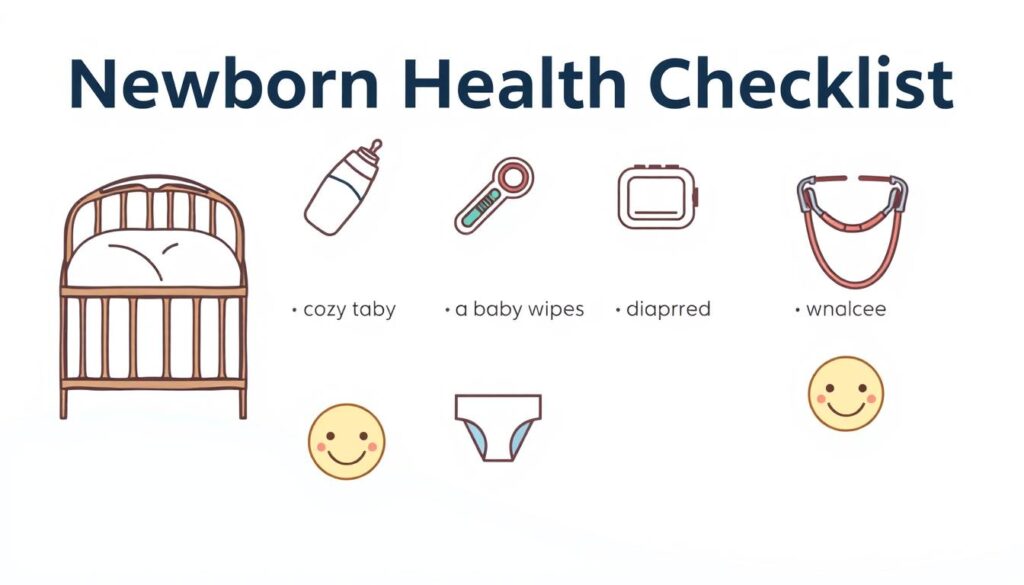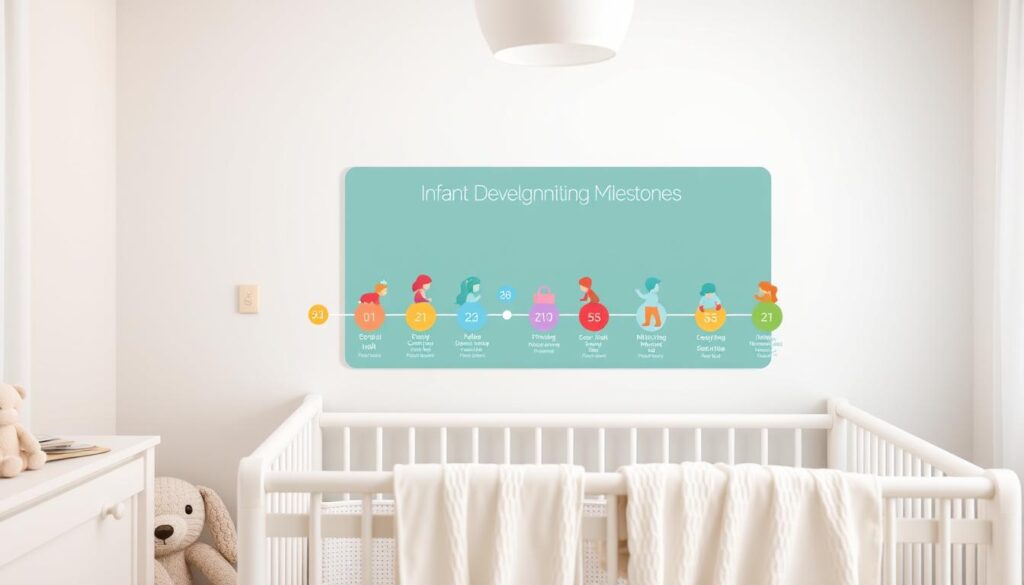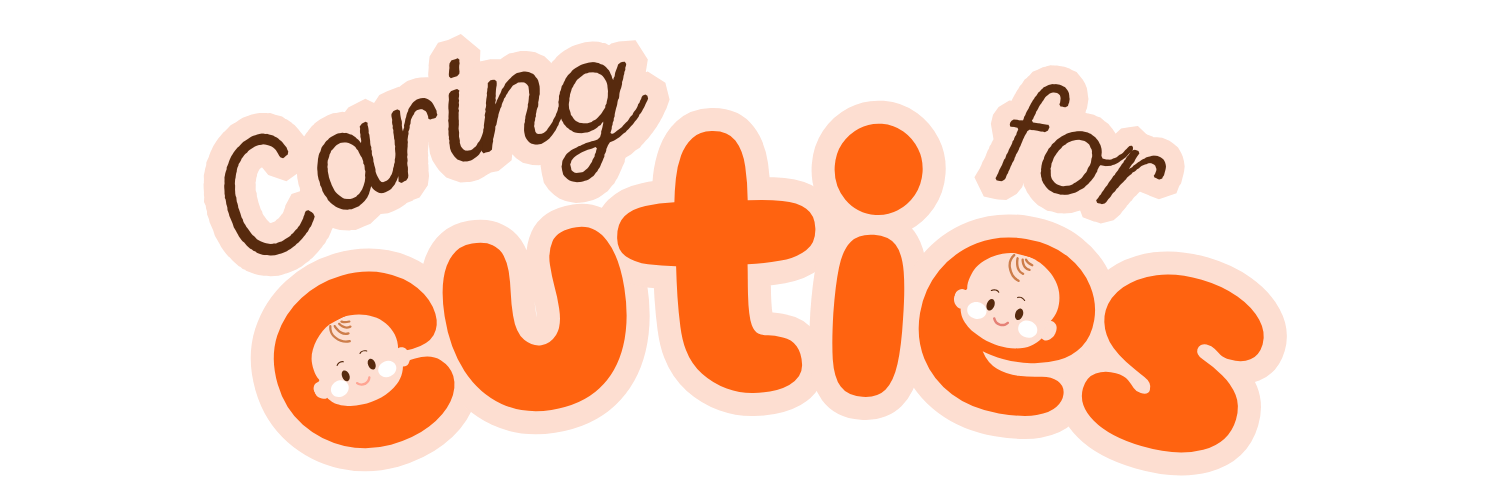Have you ever wondered what truly defines a newborn’s holistic Health and Wellness journey? Welcoming a newborn into your life is both exciting and challenging. As a first-time parent, navigating the intricate landscape of Health and Wellness needs can feel overwhelming. But don’t worry, this comprehensive guide is here to help you understand and master the essential aspects of your baby’s Health and Wellness.

Key Takeaways
- Understand the fundamentals of newborn care routines, including daily hygiene and temperature control
- Learn to monitor your baby’s physical development and identify any health concerns
- Discover the best practices for feeding your newborn, whether through breastfeeding or formula
- Explore strategies for establishing healthy sleep habits and patterns
- Familiarize yourself with the vaccination schedule and regular health check-ups
- Recognize the signs of common health issues and how to manage minor ailments
- Gain insights into your newborn’s developmental milestones and mental wellness
Understanding Essential Newborn Care Basics
Caring for a newborn is exciting but can feel overwhelming. Learning the basics of daily hygiene, safe handling, and a healthy environment is key. This guide will help you understand how to keep your baby comfortable and safe. It covers everything from bathing to choosing the right clothes and toys.
Daily Hygiene Routines for Infants
Keeping your baby clean is vital for their health. Start a regular bathing routine using gentle products. Make sure to clean the diaper area well to avoid rashes and infections.
- Bathe your baby 2-3 times per week, using lukewarm water and a soft, baby-safe washcloth.
- Gently clean and trim your baby’s nails to prevent scratches.
- Carefully clean your baby’s ears and eyes, using a soft, damp cloth.
Safe Handling and Temperature Control
Handling your baby right and keeping them at the right temperature is important. Always support their head and neck. Dress them in breathable clothes to keep them comfortable.
- Never shake or toss your baby, as this can cause serious injury.
- Keep the room temperature between 68-72°F (20-22°C) for optimal comfort.
- Dress your baby in soft, comfortable clothes and accessories suitable for the weather.
Creating a Healthy Environment
A clean, organized, and stimulating environment is key for your baby’s health. Keep their space clean and choose safe toys and equipment. This supports their growth and development.
- Regularly clean and disinfect your baby’s nursery and sleeping area.
- Introduce interactive, developmentally appropriate toys and equipment to encourage exploration and learning.
- Ensure good air circulation and minimize exposure to allergens or irritants.
By following these essential care tips, you’ll create a safe and nurturing space for your baby. This will support their health and happiness.
Physical Health Monitoring and Development Tracking
Keeping an eye on your newborn’s health and watching their growth is key. Knowing important health signs and growth patterns helps parents care for their baby. It also means getting medical help when needed.
Tracking Infant Developmental Milestones
Every baby grows at their own speed, but there are key milestones to watch. Infant developmental milestones tracking looks at physical, mental, social, and emotional growth. This includes first smiles, rolling, sitting, crawling, and saying their first words.
- Physical development: Gross motor skills like head control, rolling, sitting, and standing
- Cognitive development: Recognizing faces, responding to sounds, and exploring their surroundings
- Social and emotional development: Engaging in eye contact, expressing emotions, and interacting with caregivers
- Language development: Cooing, babbling, and eventually forming first words
Identifying Possible Health Concerns
Every baby is unique, but some signs may mean they need a doctor. These include constant fussiness, changes in eating or sleeping, unusual skin color, or slow development. By noticing these babies: health concerns, parents can quickly get help for their child’s babies: health care.
“Early detection and intervention are key to promoting optimal health and development in infants.”
Regular visits to the pediatrician and watching your baby closely are important. They help spot and fix any health or growth issues early on.

Feeding and Nutrition Guidelines for Healthy Growth
Proper nutrition is key for your newborn’s growth and development. This section will help you with feeding practices, whether you breastfeed or formula-feed. It will also tackle common challenges new parents face.
Breastfeeding Best Practices
Breastfeeding is great for you and your baby. Learn how to latch properly and understand when your baby is hungry. Make sure your nursing area is comfy. Start with exclusive breastfeeding for six months, then slowly introduce solid foods.
Formula Feeding Tips and Schedule
If you formula-feed, follow the mixing and feeding guidelines closely. Stick to a regular schedule to ensure your baby gets the right amount of formula. Watch for signs of babies: allergies & intolerances and talk to your pediatrician if you see any issues.
Common Feeding Challenges and Solutions
Parents may face feeding issues like latching problems, low milk supply, or colic. Be patient and open to trying new things. If you need help, lactation consultants or your child’s doctor can offer valuable advice. With the right support, you can tackle these challenges and keep your newborn health checklist on track.
Every first-time parent wellness guide is different. What works for one baby might not work for another. Be flexible, trust your instincts, and work with your pediatrician to find the best feeding method for your family.
Sleep Patterns and Creating Healthy Sleep Habits
As a newborn, your little one’s sleep patterns can be unpredictable and ever-changing. Understanding these sleep rhythms and establishing healthy habits early on is key for your well-being and your baby’s. Let’s explore the basics of newborn sleep and find ways to help your family get the rest you need.
Newborns sleep between 14 to 17 hours a day, with wakeful periods in between. Their sleep cycles are short, lasting 40 to 60 minutes. Knowing your baby’s sleep cues, like yawning or rubbing their eyes, helps you time feedings and soothe them.
Creating a consistent bedtime routine is vital for healthy sleep habits. This can include a warm bath, gentle massage, and a calming story. A dimly lit, quiet room and a comfortable temperature also help signal bedtime.
- Establish a predictable bedtime routine to help your newborn transition to sleep.
- Minimize stimulation and exposure to bright lights before bedtime.
- Encourage your baby to self-soothe by allowing them to fall asleep on their own, when possible.
- Consider using white noise or a sound machine to help your newborn stay asleep.
- Ensure your baby’s sleep environment is safe, comfortable, and free from hazards.
By understanding your newborn’s sleep patterns and using simple strategies, you can help them develop healthy sleep habits. This benefits the whole family. Prioritizing rest and creating a nurturing sleep environment are key parts of a newborn health checklist and first-time parent wellness guide.
“Healthy sleep habits make for healthy, happy babies.” – Dr. Harvey Karp, renowned pediatrician and author

Newborns Health and Wellness: Prevention and Care
Keeping newborns healthy is a big deal for parents and doctors. This part talks about key steps to help babies stay strong and healthy.
Vaccination Schedule and Important Updates
It’s vital to keep up with the vaccination schedule to protect babies from harmful diseases. The CDC has a detailed guide on when to get shots. Parents should talk to their pediatricians to make sure their babies get all the shots they need.
Regular Health Check-ups
Regular visits to the doctor are key to check how a baby is growing. These visits help doctors see how a baby is doing physically, mentally, and emotionally. Keeping up with these visits helps ensure babies get the care they need.
Early Warning Signs to Watch For
It’s important to spot early signs of health problems in newborns. Parents should watch for fever, trouble breathing, crying a lot, and poor feeding. Quick action can help fix these issues and keep the baby healthy.
By focusing on preventive care, parents can give their newborns a great start. This sets them up for a life of health and wellness.
Managing Common Health Concerns and Minor Ailments
As a parent, knowing about common health issues in babies is key. From diaper rash to colic, understanding these can help your baby feel better.
Diaper rash is a common problem. It can make your baby uncomfortable. To help, clean the area gently, use a barrier cream, and make sure the diaper fits right. If the rash gets worse, talk to your pediatrician.
Babies: allergies & intolerances can also be a worry, affecting babies: poos, wees & nappies. Watch for changes in bowel movements or urine. If you think your baby has an allergy or intolerance, talk to your doctor.
- Colic can be tough for parents. Try rocking, shushing, or using a pacifier to soothe your baby.
- Reflux, or stomach contents flowing back up, is another issue. Keep your baby upright after feeding and avoid overfeeding.
For eye and ear care, watch for signs of infection like redness or swelling. Clean the area gently and see your pediatrician if symptoms don’t get better.
While many issues can be handled at home, always seek medical help if you’re worried about your baby’s health. With the right care, you can keep your newborn happy and healthy.
Developmental Milestones and Mental Wellness
Newborns grow and hit various developmental infant developmental milestones tracking points. These cover social, emotional, physical, and cognitive areas. It’s key to watch these milestones to see how a baby is doing and their babies: mental health & wellbeing.
Social and Emotional Development
In the first year, babies start to connect with others, form bonds, and show feelings. They might recognize faces, respond to voices, and show emotions like happiness, anger, and surprise.
Physical Growth Indicators
Watching a baby’s physical activity shows how they’re growing. Milestones like rolling over, sitting, crawling, and walking are important. Regular doctor visits help make sure these sports and fitness goals are reached.
Cognitive Development Signs
As babies grow, they show better thinking skills, like focusing longer, solving problems, and learning words. Seeing these infant developmental milestones tracking helps parents and caregivers give the right activities. This supports a child’s mental health.
“The first few years of a child’s life are key for their growth, setting the stage for their future health.” – Dr. Sarah Johnson, Pediatrician
Knowing and tracking these important milestones helps create a caring space. It supports babies: mental health & wellbeing and encourages physical activity and sports and fitness in newborns.
Creating a Safe Environment for Your Newborn
Welcoming a newborn is a joyous moment. It also means making sure their environment is safe and nurturing. You’ll need to pick the right clothes, toys, and equipment. Also, manage screen time and encourage physical activity. This guide will help you create a safe and engaging space for your newborn.
Childproofing Essentials
Childproofing your home is key to keeping your newborn safe. Start by looking for hazards like sharp edges and small objects. Use safety gates, secure furniture, and cover electrical outlets. Make sure sports and fitness gear and toys and equipment are safe and fit your baby’s age.
Choosing the Right Toys and Equipment
Picking the right toys and equipment is vital for your baby’s growth and safety. Choose items made from safe, durable materials. They should stimulate your baby’s senses and encourage exploration. Always watch your baby during play and check that items meet safety standards.
Managing Screen Time and Physical Activity
Setting limits on screen time is important today. Instead, focus on physical activity and play. Engage your baby in floor time, tummy time, and safe exploration. As they grow, introduce sports and fitness activities that match their age and interests.
By focusing on safety, choosing the right toys and equipment, and balancing screen time and physical activity, you’ll create a safe and enriching space. Your child’s safety is the most important thing. Taking these steps will help them grow and develop well.
Conclusion
Starting your journey as a parent is exciting. This guide has given you the basics to keep your newborn healthy. You now know how to care for them, watch their growth, and solve feeding issues. You also know how to make their environment safe.
Using a holistic baby health approach is key for your baby’s growth. This guide has taught you how to meet your baby’s physical, emotional, and mental needs. This will help your baby grow strong. Remember, being a parent is a journey of learning and growing, and this first-time parent wellness guide is here to help.
We wish you and your family a happy and fulfilling journey in newborn care. Enjoy the challenges and celebrate the big moments. Cherish every moment with your baby. Together, you can create a safe and loving space for your baby to thrive.
FAQ
What are the essential daily hygiene routines for newborns?
Newborns need regular baths, diaper changes, and care for their umbilical cord. It’s also important to clean their skin, eyes, and ears. A consistent routine keeps them clean, comfortable, and healthy.
How do I ensure safe handling and temperature control for my newborn?
Hold your newborn right, supporting their head and neck. Keep the room warm, between 68-72°F. Avoid cold or hot temperatures to keep them safe.
What are the key developmental milestones I should monitor in my newborn?
Watch for signs of social, emotional, physical, and cognitive growth. Regular checks help spot any issues early. This supports your baby’s overall health.
How do I establish a healthy feeding routine for my newborn?
Learn the best ways to breastfeed or use formula. Pay attention to hunger cues and solve feeding problems. A regular feeding schedule and growth tracking are key.
What are some tips for creating healthy sleep habits for my newborn?
Make sleep safe and comfortable for your newborn. Recognize when they’re tired and have a bedtime routine. Soothing techniques and enough sleep are good for both of you.
When should I schedule regular health check-ups for my newborn?
Your newborn needs check-ups at birth, 1 week, 1 month, and every two months after. These visits help your pediatrician track growth, give vaccines, and address health issues.
How do I identify and manage common health concerns and minor ailments in my newborn?
Diaper rash, colic, reflux, and infections can often be treated at home. But, always follow your pediatrician’s advice. Early signs and timely medical help are vital for your baby’s health.
What are some tips for creating a safe environment for my newborn?
Make your home safe by childproofing and choosing the right toys. Set rules for physical activity and screen time as your baby grows. Safety is essential for their wellbeing.





